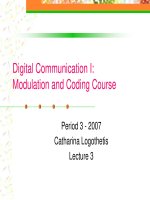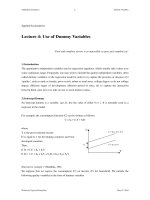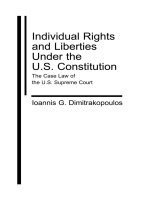Lecture 3 law of contract
Bạn đang xem bản rút gọn của tài liệu. Xem và tải ngay bản đầy đủ của tài liệu tại đây (429.07 KB, 14 trang )
LECTURE 3:
LAW OF CONTRACT
1
(a) The nature of contract
A contract is an
agreement between 2
or more parties which
is enforceable at law
2
(b) The essentials of a valid contract
• Agreement
• Consideration (exchange of value)
• Intention to create legal relations
• Legal Capacity
• Legality of Objects
• Form
• Content
3
Essential Elements (i)
Essential ingredients of a contract:
•
Agreement
• is formed when one party accepts the offer of another
• agreement must have been entered into freely and involve a ‘meeting of
minds’
• validity of contract may be affected if a person has been misled into a
contract
•
Consideration
• the parties must show that their agreement is part of a bargain
• each side must promise to give or do something for the other side
•
Intention to create legal relations
• the parties must have intention to have legal consequences
4
Essential Elements (ii)
•
Legal Capacity
• The parties must be legally capable of entering into a contract
•
Legality of Object
• The purpose of the agreement must not be illegal or contrary to public
policy
•
Form
• contract may be in any form (written or oral)
• In some cases, certain formalities must be observed
•
Content
• A contract must be complete and precise in its terms.
5
(c) Life of a contract
It remains in existence until discharged
discharged,
usually by performance
performance, where both
parties fulfill their contractual
obligations.
Most common problem is the breach of
contract, whereby one party fails to
contract
carry out their side of the contract
properly.
6
(d) Contract Types
(1)
UNILATERAL VS. BILATERAL
In a unilateral contract only one party
promises something.
For instance, if a car dealer tells a customer, "I will give you that car if you
give me $15,000," (no promise yet from customer), he has made an
offer for a unilateral contract—the contract will only be created if the
customer accepts the offer by paying the $15,000.
If the dealer says "I will promise to give you the car if you promise to pay
a bilateral contract has been
proposed because both parties must
make a promise.
me $15,000,"
/>7
Contract Types (Cont’d…)
(2)
EXPRESS VS. IMPLIED
Contracts may also be classified as "express" or "implied."
Express contracts are those in which both parties have explicitly stated
the terms of their bargain, either orally or in writing, at the time
that the contract was created.
In contrast, implied (indirect) contracts result from surrounding
facts and circumstances that suggest an agreement. For
instance, when a person takes a car to a repair shop he expects the
shop to exercise reasonable care and good faith in fixing the car and
charging for repairs. Likewise, the shop expects the customer to pay for
its services. Although no formal agreement is created, an implied
contract exists.
/>8
Contract Types (Cont’d…)
(3)
QUASI-CONTRACTS
Quasi-contracts are obligations imposed by law to avoid injustice.
For instance, suppose that a man hires a woman to paint his
house. By accident, she paints the wrong house. The owner of
the house knows that she is painting it by mistake but, happy to
have a free paint job, says nothing. The painter would likely be
able to collect something from the homeowner because he
knowingly was "unjustly enriched" at her expense. Had she
painted his house while he was on vacation, he would be under
no obligation to her.
/>
9
Contract Types (Cont’d…)
(4)
PROMISSORY ESTOPPEL
A separate type of contract, and one that overtly exemplifies the trend
away from strict interpretation and toward fairness,
fairness is created by
promissory estoppel. Under the theory of promissory estoppel, a
party can rely on a promise made by another party despite the
nonexistence of a formal, or even implied, contract. Promissory estoppel
can be evoked if allowing a promisor to claim freedom from liability
because of a lack of consideration (or some other contractual element)
would result in injustice.
Suppose that a business owner promised an employee that he would
eventually give him the business if he worked there until he (the owner)
retired. Then, after 20 years of faithful service by the employee, the
owner decides to give the business to his son-in-law. The owner could
be "estopped" from claiming in court that a true contract did not exist,
because the worker relied on the owner's promise.
/>
10
Contract Types (Cont’d…)
(5)
Simple Contract
One, the evidence of which is merely oral, or in writing, not under seal,
nor of record.
As contracts of this nature are frequently entered into without thought or
proper deliberation, the law requires that there be some good cause,
consideration or motive, before they can be enforced in the courts. The
party making the promise must have obtained some advantage, or the
party to whom it is made must have sustained some injury or
inconvenience in consequence of such promise; this rule has been
established for the purpose of protecting weak and thoughtless persons
from the consequences of rash, improvident, and inconsiderate
engagements. But it must be recollected this rule does not apply to
promissory notes, bills of exchange or commercial papers.
/>11
Contract Types (Cont’d…)
(6)
Specialty - Contracts "under seal"
In centuries past, persons contracting would drip a drop of hot wax on the
bottom of the contract and press a family ring into the
wax, thereby signifying consent to the terms of the
document.
Nowadays, deeds are used mostly - if not an outright
statutory requirement - in contracts that involve real
estate.
In legal theory, if a contract is a "deed", then no consideration is
required. If charitable donations are made under seal, they are valid
contracts even though there is no valid consideration.
12
Contract Types (Cont’d…)
(7)
Standard Form.
The standard form contract is a standard document
prepared by many large organizations and setting out
the terms on which they contract with their customers.
The individual must usually take it or leave it: he does
not really ‘agree’ to it. For example, a customer has to
accept his supply of electricity on the electricity
board’s terms; individuals cannot negotiate discounts.
13
Contract Types (Cont’d…)
•
VALIDITY STATUS
Contracts may also be categorized as valid, unenforceable, voidable, and void.
Valid contracts are simply those that meet all legal requirements.
Unenforceable contracts are those that meet the basic requirements but fail to
fulfill some other law. For instance, if a state has special requirements for
contracts related to lending money, failure to comply could make the contract
unenforceable.
Voidable contracts occur when one or both parties have a legal right to cancel
their obligation(s). A contract entered into under duress, for example, would be
voidable at the request of the injured party.
Void contracts are those that fail to meet basic criteria, and are therefore not
contracts at all. An illegal contract, for example, is void.
/>
14









